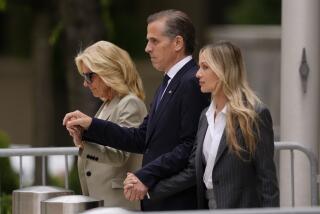Mixed verdict at terror tribunal
- Share via
GUANTANAMO BAY, CUBA — A military jury Wednesday convicted Osama bin Laden’s driver of supporting terrorism in the first trial conducted by an American war crimes tribunal since World War II, but his acquittal on other charges gave both defenders and critics of the controversial process reason to declare victory.
In the culmination of nearly seven years of Bush administration efforts to prosecute suspects in the war it has declared on terrorism, Salim Ahmed Hamdan was found guilty of providing material support for terrorism through his work as a driver and occasional bodyguard for the Al Qaeda leader.
But the jury acquitted Hamdan of the more serious charges of conspiracy, apparently rejecting the government’s argument that the Yemeni had intended to aid terrorist attacks by providing his services.
Hamdan quietly collapsed in tears at the defense table as the Navy captain heading the jury of six senior officers read its decisions on 10 counts of alleged conspiracy and material support. “He was upset about a finding of guilty on any of these charges,” defense lawyer Joseph McMillan said.
Hamdan was acquitted of two counts of conspiracy, as well as three of the eight material-support counts.
--
‘A fair trial’
The White House issued a statement Wednesday saying that Hamdan had received “a fair trial.” Sen. John McCain, the presumptive Republican presidential nominee, said the split verdict proved that the tribunal was balanced.
“The fact that the jury did not find Hamdan guilty of all of the charges brought against him demonstrates that the jury weighed the evidence carefully,” McCain said.
His Democratic rival, Sen. Barack Obama, praised the jurors for diligent service despite what he called a flawed process but said such cases should be tried in established U.S. courts.
“While it is important to convict anyone who provides material support for terrorism, it is long past time to capture or kill Osama bin Laden and the terrorists who murdered nearly 3,000 Americans,” Obama said.
The trial judge, Navy Capt. Keith J. Allred, consolidated the five guilty verdicts into a single count and instructed the jurors to determine a sentence accordingly. He also said he would credit Hamdan with at least five years’ time served toward any sentence.
But Allred withheld a decision on a defense request to award three to five times credit for time Hamdan served in solitary confinement or other harsh conditions. That could credit him with more than seven years.
In a sentencing hearing that got underway three hours after the verdict, a Bay Area forensic psychiatrist and former UC San Francisco School of Medicine professor testified about Hamdan’s bleak early life, which she said made him vulnerable to Al Qaeda recruiters.
Emily Keram told the court that Hamdan had been deeply shaken by video images of the Sept. 11 attacks shown at the trial. It was the first footage of the attacks he had seen, as he was in remote southern Afghanistan in September 2001 and was captured a little more than two months later.
“It’s hard on my soul,” Keram quoted Hamdan as saying.
She described the defendant’s rehabilitation potential as “excellent.”
Allred barred the prosecution from calling an FBI agent to testify about the horrors and injuries he encountered while on duty in New York on Sept. 11, 2001. The judge told Justice Department lawyer John Murphy that Hamdan “was such a small player” that it would be prejudicial to link him directly to that “horrific” day.
--
Appeals process
Under the Military Commissions Act of 2006, the law empowering the tribunal to try terrorist suspects held at Guantanamo, the government cannot appeal the acquittals.
The convictions will be automatically appealed to a Court of Military Commissions Review, and defense lawyers can also appeal to a federal appellate court in Washington.
Murphy, lead prosecutor on the Hamdan case, had cast the defendant as a willing and eager accomplice of Bin Laden who shared the Al Qaeda leader’s extremist ideology.
“It is highly significant that this panel, hearing this evidence, rejected such an aggressive extension of conspiracy doctrine,” said McMillan, a Seattle attorney volunteering on Hamdan’s defense team.
The split verdict suggested that the jurors heeded Allred’s instructions Monday that in the war theater of Afghanistan, a combatant attack on invading U.S. forces did not constitute a war crime. Prosecutors had argued that two SA-7 missiles found in Hamdan’s possession when he was arrested could only have been intended for use against U.S. warplanes.
It was unclear whether the jury’s decisions were unanimous: Military commissions, as the trials are called, require a two-thirds majority for conviction, and votes are secret.
Hamdan’s military lawyer, Navy Lt. Cmdr. Brian Mizer, heralded Allred’s consolidation of the convictions on the multiple “specifications,” or counts. Analysts said it now would be easier for the jury to impose a lesser sentence than the maximum allowed, life in prison.
“There were 10 specifications this morning. Now there’s one,” Mizer said.
Defense lawyer Charlie Swift noted that Hamdan had been charged only with conspiracy in the original indictment in 2004, charges that were nullified in June 2006 when the U.S. Supreme Court ruled in Hamdan vs. Rumsfeld that the tribunal system established by the Bush administration was unconstitutional.
Congress passed the Military Commissions Act establishing a new system four months later.
--
Indefinite detention?
Despite the potential for a sentence less than or equal to the time he already has served, Hamdan has been told by his lawyers of the Bush administration’s intent to keep all branded “enemy combatants” detained indefinitely, regardless of any acquittals.
Swift said that position would be challenged vigorously by the defense.
Defense lawyers and rights advocates praised the military jurors for showing independence of thinking in rejecting the conspiracy charges. But they said the tribunal remains deeply suspect.
“Hamdan’s trial violated two of the most fundamental criminal justice principles accepted by all civilized nations: the prohibition on the use of coerced evidence and the prohibition on retroactive criminal laws,” said Shayana Kadidal, senior managing attorney for the New York-based Center for Constitutional Rights.
The verdict, rendered after less than eight hours of deliberation, “reflects extremely well on the six officers given the unenviable task of participating in a badly flawed system,” said David Glazier, a Loyola Law School associate professor and Navy veteran. Like other critics of the tribunal, he praised the jurors for taking their duty seriously and acting impartially.
John Wesley Hall, president of the National Assn. of Criminal Defense Lawyers, called Hamdan “arguably the least culpable” of the 80 Guantanamo prisoners the U.S. plans to try. The court “convicted a truck driver of being guilty of driving a truck,” he said.
Tribunal advocates proclaimed the conviction a vindication of the process that has been criticized widely since President Bush created it in November 2001.
Army Col. Lawrence Morris, the chief prosecutor, said that he was “wholly satisfied” with the verdict and that it “validated in its essence” the fairness and openness of the tribunal.
“Hamdan’s conviction on some but not all counts should dispel any speculation that this was a kangaroo court,” said Jeff Addicott, director of the Center for Terrorism Law at St. Mary’s University in San Antonio.
--
--
(BEGIN TEXT OF INFOBOX)
Back story: military detentions
The United States currently holds about 265 prisoners at its Guantanamo Bay, Cuba, military detention center and has released or transferred to other governments more than 500 detainees. Military prosecutors have sought charges against 22 prisoners, and 20 of those cases are still pending.
Two Guantanamo prisoners have been convicted: Osama bin Laden’s Yemeni driver Salim Ahmed Hamdan, who was the first to undergo a complete trial, and Australian David Hicks. Hicks avoided trial by admitting that he trained with Al Qaeda in Afghanistan and pleading guilty in March 2007 to providing material support for terrorism. He finished his nine-month sentence in Australia on Dec. 29.
Prosecutors are seeking the death penalty in seven of the pending cases, including those of five men accused of plotting the Sept. 11 attacks on the United States using hijacked airliners that killed nearly 3,000 people.
Sources: U.S. Department of Defense, Reuters
More to Read
Sign up for Essential California
The most important California stories and recommendations in your inbox every morning.
You may occasionally receive promotional content from the Los Angeles Times.











